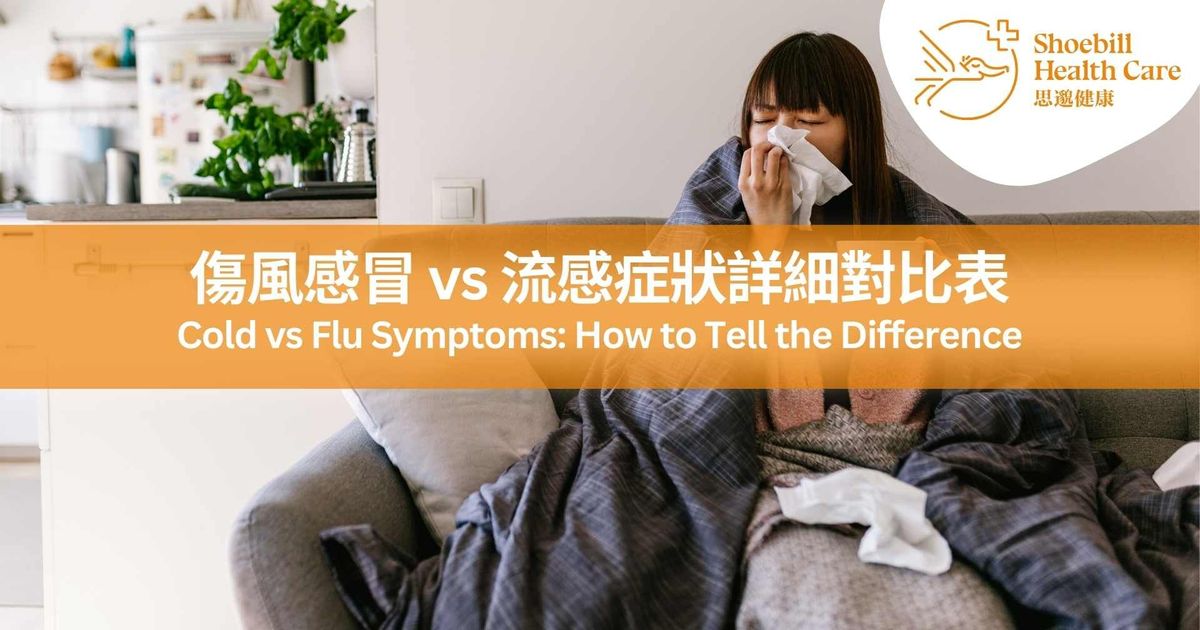Cold vs Flu Symptoms: How to Tell the Difference & Prevention Guide | Free 2025/26 Flu Vaccine Booking Hong Kong - Shoebill Health Care
How to tell cold from flu symptoms? Shoebill Health Care provides detailed comparison between cold and influenza symptoms, including fever, body aches, and fatigue. Learn about flu complication risks and prevention methods. Check now for 2025 flu vaccination options.

Waking up with a runny nose, cough, and fever - is it just a common cold or something more serious like the flu? Many people struggle to tell these two illnesses apart, but understanding the differences in symptoms and complication risks is crucial for proper care.
Cold vs Flu Symptoms Comparison Table
| Symptom | Common Cold | Influenza (Flu) |
|---|---|---|
| Onset | Gradual | Sudden |
| Fever | Rare | Common; lasts 3-4 days |
| Body Aches | Mild | Common; often severe |
| Chills | Uncommon | Fairly common |
| Fatigue & Weakness | Sometimes | Usual (may last 2-3 weeks) |
| Sneezing | Common | Sometimes |
| Chest Discomfort & Cough | Mild to moderate | Common; can become severe |
| Stuffy Nose | Common | Sometimes |
| Sore Throat | Common | Sometimes |
| Headache | Rare | Common |
Source: US Centers for Disease Control and Prevention (CDC)
Why It Matters to Tell Them Apart
Influenza is more serious than the common cold because it:
- Causes more severe symptoms
- Carries higher risk of complications
- Spreads more easily
- Poses greater threat to vulnerable groups
High-Risk Groups Need Extra Caution
These groups are more likely to develop serious flu complications:
- Adults 65 years and older
- Pregnant women
- Children 6 months to 5 years
- People with chronic conditions (heart disease, diabetes, respiratory conditions)
- People with weakened immune systems
- Looking for child-specific information? We have a complete guide for parents covering vaccination preparation, required documents, and FAQs: Hong Kong Children's Flu Vaccination Guide 2025/26.
Most Effective Flu Prevention Methods
1. Get Vaccinated Against Flu
- Prevention is better than treatment. Annual flu vaccination is the most effective way to prevent influenza and its serious complications
- The Hong Kong Government provides subsidized programs for eligible individuals
- Want details on the 2025/26 flu vaccine side effects, pricing, and subsidy eligibility? See our comprehensive guide: 2025/26 Free Flu Vaccine Booking.
- Ready to get vaccinated? Our step-by-step guide explains the booking process: Flu Vaccination Process Guide.
Take action now:
- Book Your Flu Vaccination Now
- Unsure about the process? Review our Vaccination Process Guide first
2. Practice Good Hygiene
- Wash hands frequently with soap
- Cover mouth and nose when sneezing or coughing
- Stay home when sick
When to Seek Immediate Medical Care
Contact a doctor immediately if you experience:
- Difficulty breathing or chest pain
- High fever lasting more than 3 days
- Severe vomiting preventing fluid intake
- Symptoms that improve then return worse


